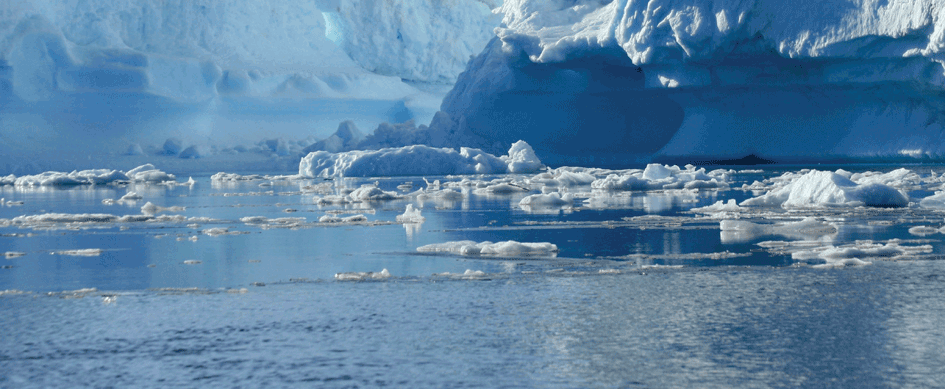 Klaus Dodds, Alan D. Hemmings and Peder Roberts discuss their new Handbook examining the complex politics of Antarctica.
Klaus Dodds, Alan D. Hemmings and Peder Roberts discuss their new Handbook examining the complex politics of Antarctica.
The multifaceted nature of ‘The Politics of Antarctica’ which we have sought to illuminate in our new Handbook is nicely shown in the protracted process of designating the Ross Sea Marine Protected Area (RS-MPA). The ‘lines’ being drawn on the sea are suggestive of a struggle to imagine and impose a new administrative order for the Southern Ocean. As the histories of the polar regions remind us, any project involving politically-negotiated lines and management control is likely to attract controversy.
The RS-MPA was eventually designated on 28th October 2016, as our Handbook was in production.

National representatives of New Zealand and the United States, as proponents of RS-MPA, and the Russian Chair of CCAMLR with an image of the area, at its adoption in Hobart on 28th October 2016.
Formally, the adoption is achieved through what is termed a Conservation Measure, which specifies the area, modalities, duration, etc. of the MPA.
The MPA designation comes into force on 1 December 2017, but during 2017 so-called technical meetings will also be held to discuss the all-important implementation process. Ostensibly technical matters notwithstanding, the story of the RS-MPA involves the intersection of fisheries science, oceanographic expertise, environmental management and Antarctic and Southern Ocean politics.
In 1991, the adoption of the Madrid Protocol expanded the application of Protected Areas in Antarctica to include marine areas. However, a political decision was taken by Antarctic states that future MPA proposals would in fact be reviewed by another decision-making body within the Antarctic Treaty System, the Commission for the Conservation of Antarctic Marine Living Resources (CCAMLR), which has its own scientific-technical advisory bodies. In 2009, the first MPA was agreed (in the South Atlantic sector of the Antarctic) after some serious diplomatic compromise over its final outer limits. After a “general framework” for MPAs was agreed in 2011, three further proposals for MPAs made in 2012 came up against major opposition from a number of states with significant interest in commercial fishing in Antarctic waters, including China, Ukraine and (most critically) Russia. Other fishing states and the EU were more sanguine. One of the three proposed MPAs, in the Ross Sea (in the South Pacific sector of the Antarctic), became the dominant issue at CCAMLR meetings – and a special meeting was even convened to discuss the issue. Successive US Secretaries of State Clinton and Kerry, Russia’s President Putin and Foreign Minister Lavrov, and Foreign Ministers and other high officials of other states – both proponents and opponents – were directly engaged in Antarctic affairs in a manner not seen since the late 1950s. The fate of fish revealed the role and extent of contested knowledge claims and threated to expose the consensual nature of Antarctic politics to wider public scrutiny.
“We had a lot of talks with them. Secretary (John) Kerry reached out to Russian President (Vladimir) Putin and (Foreign Minister Sergei) Lavrov and I think that helped a great deal to convince Russia to come on board,” said Evan Bloom, head of the US delegation.
The MPA issue is picked up by contributors in a number of chapters of the Handbook [in detail in 1, 11, 18, 27, 32, 33], and most substantively by Cassandra Brooks and David Ainley in Chapter 27.
So, why the difficulty? Initially there was simply no agreement – and the Antarctic political system requires consensus to arrive at any decision – that there was a problem to be addressed. Then, there was a scientific near-consensus that the dual pressures of climate change and human activity (largely fishing) justified some sort of response; and the appropriate response came to be seen as requiring area protection. At this stage, one can see science operating as both an objective assessor and as a political agent – both in its own right, and as an agent for the particular political preferences of individual states. But as the debate moved from the theoretical and technical to consideration of actual proposals, the perceived economic and political costs of MPAs were raised – a zero-sum-game for fishing interests for MPA opponents versus MPAs as a necessary safeguard for sustainable fisheries for MPA proponents.
 Then the apparent coincidence of the MPA proposals and proponents with particular territorial claims (see Figure 27.2 above, taken from the handbook) was noted. The MPA debates – and the Ross Sea MPA debate in particular – demonstrate how fisheries/environmental protection became a lightning rod for older and wider Antarctic anxieties. Critics of Antarctic MPAs accused proponents of aligning their own favoured lines on the map. Debate erupted about whether CCAMLR now had the legal competence to actually designate new MPAs (curious this, since the states that argued this had been part of the necessary consensus to designate the first MPA in 2009!). With the extended failure to designate the Ross Sea MPA (or any other of the proposed MPAs), the credibility of CCAMLR and the wider Antarctic Treaty System itself was questioned. Trust and goodwill seemed in short supply.
Then the apparent coincidence of the MPA proposals and proponents with particular territorial claims (see Figure 27.2 above, taken from the handbook) was noted. The MPA debates – and the Ross Sea MPA debate in particular – demonstrate how fisheries/environmental protection became a lightning rod for older and wider Antarctic anxieties. Critics of Antarctic MPAs accused proponents of aligning their own favoured lines on the map. Debate erupted about whether CCAMLR now had the legal competence to actually designate new MPAs (curious this, since the states that argued this had been part of the necessary consensus to designate the first MPA in 2009!). With the extended failure to designate the Ross Sea MPA (or any other of the proposed MPAs), the credibility of CCAMLR and the wider Antarctic Treaty System itself was questioned. Trust and goodwill seemed in short supply.
As we note in Chapter 1, the MPA affair also became caught up in the wider Antarctic “debates and controversies” between Western ‘conservation’ states on the one hand and their feared ‘others’ – most obviously ‘resource-hungry’ China and re-assertive Russia. Here extra-Antarctic differences seemed to coalesce with Antarctic differences, where Alessandro Antonello in Handbook Chapter 11 sees MPAs constituting a “contested space in contemporary Antarctic politics”.
Having been adopted in late 2016, the RS-MPA is expected to enter into force, as planned, on 1 December 2017. But as the former British Prime Minister Harold Wilson once noted, even a week is a long time in politics. In the face of a new Trump Presidency, who would be so bold as to assume that any international settlement entered into by the previous Obama administration is necessarily secure? Putting ‘America First’ does not necessarily mean that the country’s historic support of the Antarctic Treaty System is immune from fundamental change. John Kerry’s welcoming of the Ross Sea MPA designation is already consigned to the archives of the Department of State.
Might the Ross Sea MPA be remembered one day as a transient pulse rather than a solid step on the path to a more internationalized and stable Antarctic?
As our Handbook warns, the exceptional qualities of Antarctic politics do not seem quite as assured as they might have seemed in Washington DC on 1 December 1959 – the day of the signing of the Antarctic Treaty. Even a document as flexible and admired as the Treaty and its associated instruments ought not to be regarded as possessing a transcendent permanence independent of political developments far to the continent’s north.
Klaus Dodds is Professor of Geopolitics at Royal Holloway, University of London, UK, Alan D. Hemmings is Adjunct Associate Professor at the Gateway Antarctica Centre for Antarctic Studies and Research, University of Canterbury, New Zealand and Peder Roberts is Researcher at the Division of History of Science, Technology and Environment, KTH Royal Institute of Technology, Sweden.
Handbook on the Politics of Antarctica edited by Klaus Dodds, Alan D. Hemmings and Peder Roberts is available now.
Read Chapter 1 free on Elgaronline.



Leave a Reply